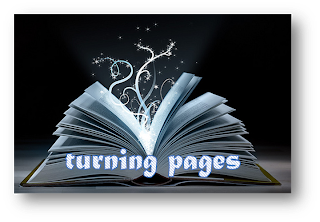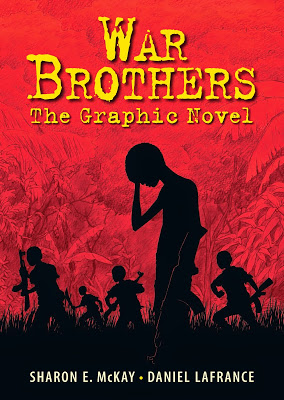 This is a story about child soldiers in Uganda, in Africa, and about Kony Joseph. It’s fictional, but based on a true account. Despite the boatload of honors and awards (Popular Paperbacks for Young Adults 2014, YALSA Great Graphic Novels for Teens List, Top Ten, 2014, YALSA Best Books for Kids and Teens 2013, starred selection, Canadian Children’s Book Centre 2014 Maverick Graphic Novel List, Texas Library Association 2014 USBBY Outstanding International Book Quick Picks for Reluctant Readers 2014, YALSA 2014 Independent Publisher Book Award, Gold Cybils Award finalist Book of the Year Award finalist, ForeWord Reviews 2014 Eisner Award, Best Graphic Novel nomination Stellar Book Award nomination), I honestly did not want to read it — like many of you, I read fiction because I like to escape from the ugliness of reality. However, I also know that those of us who escape are privileged to do so – and I’d rather use my privilege, when I can, to bear witness rather than to hide, because all lives matter. I was further schooled by the brief note from the young man on whose life story this novel is based. The final thoughts of the character made me push through:
This is a story about child soldiers in Uganda, in Africa, and about Kony Joseph. It’s fictional, but based on a true account. Despite the boatload of honors and awards (Popular Paperbacks for Young Adults 2014, YALSA Great Graphic Novels for Teens List, Top Ten, 2014, YALSA Best Books for Kids and Teens 2013, starred selection, Canadian Children’s Book Centre 2014 Maverick Graphic Novel List, Texas Library Association 2014 USBBY Outstanding International Book Quick Picks for Reluctant Readers 2014, YALSA 2014 Independent Publisher Book Award, Gold Cybils Award finalist Book of the Year Award finalist, ForeWord Reviews 2014 Eisner Award, Best Graphic Novel nomination Stellar Book Award nomination), I honestly did not want to read it — like many of you, I read fiction because I like to escape from the ugliness of reality. However, I also know that those of us who escape are privileged to do so – and I’d rather use my privilege, when I can, to bear witness rather than to hide, because all lives matter. I was further schooled by the brief note from the young man on whose life story this novel is based. The final thoughts of the character made me push through:
My story is not an easy one to tell, and it is not an easy one to read. The life of a child soldier is full of unthinkable violence and brutal death. But this is also a story of hope, courage, friendship and family. We Ugandans believe that family is most important.
I thought you should be prepared for both the bad and the good. There is no shame in closing this book now.
– Jacob, Gulu Uganda, 2009
Okay, I thought to myself. I’m reading on.
 Summary: Jacob is of the Acholi ethnic tribe of Uganda, and a student at the George Jones Seminary for Boys, a Catholic boarding school. Together, with his friend Tony, whose family is poor, they study hard and do their best. When one night, they are abducted from the school, all of Jacob’s family’s money and influence and extra guards cannot help him.
Summary: Jacob is of the Acholi ethnic tribe of Uganda, and a student at the George Jones Seminary for Boys, a Catholic boarding school. Together, with his friend Tony, whose family is poor, they study hard and do their best. When one night, they are abducted from the school, all of Jacob’s family’s money and influence and extra guards cannot help him.
What follows next is a journey into madness. Brutality is the byword, from the first moment. As in many wartime scenarios, the boys are taken out by soldiers little older than themselves, beaten for imaginary infractions, and then forced on a long march. Those who fell on the march are given “rest” of a permanent sort – by the hands of boys once their schoolmates and friends. If they don’t kill, they are killed. It is beyond brutal. But, just when you think you can’t read anymore – a light shows at the end of the tunnel. The pace of the novel rockets forward into danger, suspense and terror. A well-written and scary account of a true-to-life abduction and escape, this book will keep you on the edge of your seat – and in turmoil, as you look at yourself, and wonder how you would have reacted – and whether what was done – and what the UN is doing now – is the answer…
Conflict in fiction is often man-against-nature. In this novel it is man-against-nature, man-against-man, and man-against-himself. The time as prisoners and the time of escape is intense and well-written. There are the personal betrayals of the self – the things we do when we are desperate and alone – and there are the triumphs of spirit that happen when we are more than we think we can be. The betrayal of society – of the larger world who is either indifferent or too frightened to do anything – is horrific, and what urged me to read this book to begin with.
Conclusion: Since this is terrorism and war, this isn’t a “fun” novel, but it is a true novel – and as Jane Yolen says, “telling the true” is one of the most important gifts writers, thinkers, and speakers have to give. This is an unflinching and brave look at the inhumanity of the war without end that plagues some of the developing nations of our world, which forces us to examine the inhumanity of people to each other, and look inside of ourselves and wonder, could we do better?
The author, Sharon E. McCay, is Canadian and Irish, and grew up between Montreal and Belfast. She knows what it is to make a life filled with joy and family, in the midst of troubles. She went to Gulu, Uganda, and interviewed child soldiers to write a graphic version of this novel, with art by Daniel Lafrance, and later turned it into the novel form I read.
I received my copy of this book courtesy of Annick Press. In graphic or novel form (cover shown is the graphic novel), can find WAR BROTHERS by Sharon E. McKay at an online e-tailer, or at a real life, independent bookstore near you!